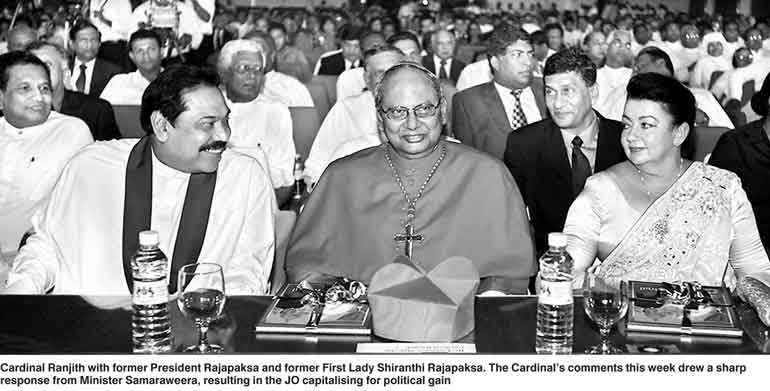Wednesday Feb 18, 2026
Wednesday Feb 18, 2026
Saturday, 29 September 2018 00:10 - - {{hitsCtrl.values.hits}}

By Our Special Political Correspondent
This week too the depreciation of the Sri Lankan Rupee took centre-stage given the impact it could have in the coming months. Rather than solid action to arrest it, it was once again a week full of utterances and assurances from the Government. On Wednesday, the rupee hit a fresh low of 169.05 on importer dollar demand.
The speculation that it will hit 180 by the year end was once again fuelled largely by offhand statements made by some politicians. A Minister even went to the extent of saying even if it went up to 200, he said “we know what to do”.
Finance Minister Samaraweera went to the extent of advising people to buy local products and shun unnecessary imports in order to reduce the trade deficit and help stabilise the rupee. State Minister of National Policies and Economic Affairs Dr. Harsha de Silva asked the high-income earners of the country to be socially conscious to help cut the demand at the margin in the face of the rapid rupee depreciation.
“Social consciousness of our high income people is also important now; perhaps postpone by just a couple of months that new luxury car or that trip to Alaska. These will all help to cut the demand at the margin,” Dr. Silva said in a Facebook post.
To make matters complicated for the Government, Minister Samaraweera, who has developed a habit of responding to everything but the kitchen sink, tweeted in response to Archbishop Cardinal Malcolm Ranjith’s remarks that human rights had become the religion among the Western nations, saying: “The Cardinal seems to have got things wrong in trying to be a populist.”
Former President Mahinda Rajapaksa quickly jumped into the controversy to add his two cents by denouncing Minister Mangala Samaraweera’s response to Archbishop Malcolm Cardinal Ranjith and asked whether the response was the Government’s opinion. He expressed these views to media after a group of Catholic MPs and Provincial Councillors met him to express their displeasure over Minister Samaraweera’s response.
“We want to know whether this is the opinion of the Government or its policy. We condemn Minister Samaraweera’s statement. Even many Buddhists, Muslims, Hindus and Catholics spoke to me and said they are against this. The Cardinal has simply made a statement inside a church during a service. Criticising it in this manner is wrong,” he said. “The Prime Minister should make a statement over the issue.”
Many expected the Prime Minister to make a statement swiftly and say that the comment was Minister Samaraweera’s personal opinion and not that of the Government. As usual he failed to capitalise, allowing the Opposition to capitalise.
Rajapaksa said: “We see this as a bad precedent. If statements of religious leaders were continued to be defamed like this, there will be no end to it.”
Meanwhile, the Cardinal sent a clarification and said: “What I basically intended to say on this matter was that if religion is truly practiced it could take us to achieve levels of justice, going even beyond the expectations of human rights and thus need not be such an issue for our Catholic community and so encouraged the flock gathered at that particular religious ceremony to, therefore, practice their faith truthfully avoiding turning religious values into something that is ephemeral. But I do accept that with regard to the essentially non-religious nature of the State, human rights as a common platform has its own role to play. Replacing religion with human rights is not what is to be done but human rights should be further strengthened through the good practice of faith.”
 The Cardinal’s message was spot on, leaving the church-going congregation to decide on Mangala’s fate.
The Cardinal’s message was spot on, leaving the church-going congregation to decide on Mangala’s fate.
The Finance Minister, given the crisis we are in, should focus on those problems rather than engaging in feuds that have no value to anyone other than to the Opposition.
The other topic that dominated the corporate corridors was that the Government Analyst has been called in to investigate a suspicious fire that broke out two weeks ago engulfing the building housing the local office of international audit firm PricewaterhouseCoopers (PwC).
The Commission of Inquiry into SriLankan Airlines had written to PwC asking the firm to provide the files in their possession relating to the incomes of certain former Board members of the airline and Central Bank transactions. Investigators say that many of the paper files – that were stacked along the wall – got burnt, suspecting the fire may have been orchestrated to destroy the laptops and the documents.
A senior partner of that firm it is said was a close associate of the former regime, had even visited St. Kitts (known more formally as Saint Christopher Island, is an island in the West Indies) to help secure the Commonwealth Games for Sri Lanka. Had we got the games, Sri Lanka’s foreign debt, which is now 77% of GDP, would been very much higher, and given our poor debt servicing capabilities we would have surely hit the dust with the anticipated surge in the US Dollar and the oil prices.
Once the need for a dictatorship, an authoritarian form of government, characterised by a single leader, was discussed at a professional forum. It was however clearly noted that the issue was more to do with getting things done, rather than having despotic political power as seen in the past.